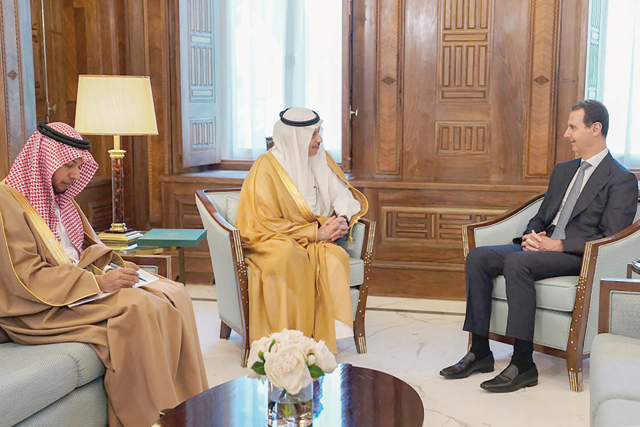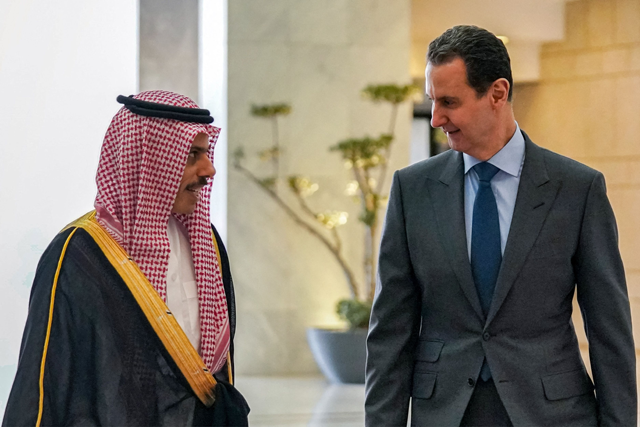You are here
Syria's Assad receives Saudi invitation to Arab summit
By AFP - May 10,2023 - Last updated at May 10,2023

This handout photo released by the Syrian Presidency Telegram account on Wednesday shows Syrian President Bashar Assad meeting with Saudi's ambassador to Jordan, Nayef Bin Bandar Al Sudairy, in Damascus (AFP photo)
DAMASCUS — Syrian President Bashar Al Assad received an invitation to next week's Arab summit in Saudi Arabia, the presidency said Wednesday, the first such invitation since the country's war began.
The pan-Arab body had suspended Damascus in November 2011 over its crackdown on protests, which began earlier that year and spiralled into a war that has killed more than 500,000 people, displaced millions and battered the country's infrastructure and industry.
On Sunday, the Arab League welcomed back Syria's government, securing Assad's return to the Arab fold after years of isolation.
Assad received an invitation from Saudi King Salman "to participate in the thirty-second Arab League summit, which will be held in Jeddah on May 19", the Syrian presidency said in a statement.
Assad said the summit "will enhance joint Arab action to achieve the aspirations of the Arab peoples," the statement added.
Saudi Arabia's ambassador to Jordan, Nayef Bin Bandar Al Sudairi, delivered the invitation.
The last Arab League summit Assad attended was in 2010 in Libya.
The invitation comes a day after Riyadh and Damascus announced that work would resume at their respective diplomatic missions in Syria and Saudi Arabia, after more than a decade of severed relations.
Diplomatic flurry
The kingdom cut ties with Assad's government in 2012 and Riyadh had long openly championed Assad's ouster, backing Syrian rebels in earlier stages of the war.
But a flurry of diplomatic activity has been underway since a deadly earthquake struck Syria and Turkey on February 6.
A decision in March by former arch-rivals Saudi Arabia and Iran, a close ally of Damascus, to resume ties also shifted the political landscape.
In April, Saudi Foreign Minister Prince Faisal Bin Farhan met with Assad in Damascus on the first such visit since the war broke out.
Regional capitals have gradually been warming to Assad as he has stubbornly held onto power and clawed back lost territory with crucial support from Iran and Russia.
In 2018, the United Arab Emirates re-established ties with Syria and has been leading the recent charge to reintegrate Damascus into the Arab fold.
Turkey, which supported early rebel efforts to topple Assad and maintains a military presence in Syria’s north, has also shown interest in mending ties with Damascus.
The foreign ministers of Syria and Turkey were meeting Wednesday in Moscow for the first time since the start of the war.
Russia’s top diplomat proposed a roadmap to normalise Syrian-Turkish ties, with Iran’s foreign minister also attending the meeting.
Arab leadership
While Syria’s front lines have mostly quietened, large parts of the north remain outside government control, and no political solution to the conflict is in sight.
Top diplomats from nine Arab countries discussed the Syria crisis in Saudi Arabia last month.
Officials at several recent meetings have said Arab leadership would be needed to find a settlement to the conflict.
The fate of millions of Syrian refugees, many of them living in neighbouring Turkey, Jordan and Lebanon, are among some states’ main concerns.
Several Arab countries are also seeking increased security co-operation with Syria, which has turned into a narco-state with a $10 billion captagon industry, mostly trafficked to the Gulf.
During a meeting of several Arab foreign ministers in Jordan on May 1, Damascus agreed to “enhance cooperation” with countries “affected by drug trafficking and smuggling across the Syrian border”, a statement said.
On Monday, an air strike killed a major drug smuggler and his family in southern Syria, a war monitor said, attributing the strike to Jordan, which has neither confirmed nor denied the hit.
Assad hopes normalisation with wealthy Gulf states can bring economic relief and money for reconstruction, as broader international funding remains elusive without a United Nations-backed political settlement to the conflict.
Analysts say Western sanctions on Syria are likely to continue to deter investment.
The United States and Britain said Tuesday they still opposed relations with Assad, with US Secretary of State Antony Blinken telling reporters in Washington “we are not going to be in the business of normalising relations with Assad and with that regime”.
Related Articles
DAMASCUS, Syria — Syrian President Bashar Assad met with Saudi Arabia's top diplomat in Damascus on Tuesday, state media reported, ending mo
CAIRO — The Arab League on Sunday welcomed back Syria's government, ending a more than decade-long suspension and securing President Bashar
RIYADH — Syria ended over a decade of exile from the Arab League on Monday as its officials took part in a preparatory session ahead of Frid


















